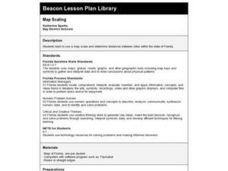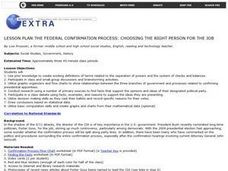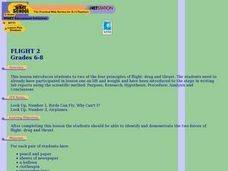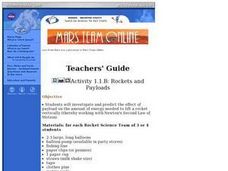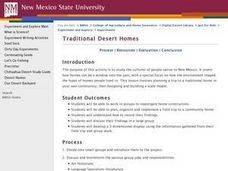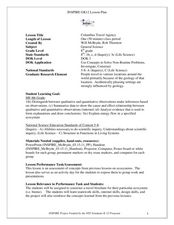Curated OER
Genetic Variations in Hand Span Size
Students study genes. In this biology lesson plan, students measure their handspan size to determine if one pair or many pairs of genes control that trait.
Curated OER
Map Scaling
Second graders use a map scale to determine distances between cities in the state of Florida.
Curated OER
Floating Soap
Learners explore the density of soap. In this science instructional activity, students conduct an experiment to find which types of soap will float. Learners make a hypothesis and record their observations.
Curated OER
Hop To It!
Students explore the aspects of a frog's anatomy that allow it to be such a good jumper and jump and record the length of each jump to determine which style of jumping allows them to jump the farthest.
Curated OER
The Difference Between Comets, Meteors And Asteroids
Students use Venn diagrams to highlight the similarities and differences between comets, meteors, and asteroids.
Curated OER
Are things Really More Expensive Today?
Students explore the topics of inflation and deflation within the economy. The Consumer Price Index is used to contrast the price of goods today with that of years past.
Curated OER
THE FEDERAL CONFIRMATION PROCESS: CHOOSING THE RIGHT PERSON FOR THE JOB
Students analyze the process whereby presidential appointees are confirmed.
Curated OER
Solving Problems
For this solving problems worksheet, learners answer twelve multiple choice questions about problem solving in science and the steps of the scientific method. These include identifying the problem, forming a hypothesis and setting up the...
Curated OER
Light Plants and Dark Plants, Wet Plants and Dry Ones
Young scholars plant sunflower seeds in plastic cups, and once germinated, these are exposed to different conditions of light levels and/or soil moisture contents. Students measure growth of the seedlings every few days using...
Curated OER
Flight 2
Students are introduced to two of the four principles of flight: drag and thrust. As the class watches a video on these principles, they utilize ballons, straws and clothepins to simulate what they're seeing in the show. Nice, hands-on...
Curated OER
Rockets and Payloads
Young scholars investigate Newton's Second Law of Motion as they predict the effect of a payload on the amount of energy needed to lift a rocket vertically. The constraints of the weight of the equipment carried to Mars is compared to...
Curated OER
Traditional Desert Homes
Students go to a traditional style desert home and then build their own model of a home to scale. In this desert home lesson plan, students conduct their research in New Mexico.
Curated OER
Stimulus Response
Students explore the five steps in the stimulus-response pathway. They analyze the senses and the difference between animals' primary and secondary senses. Students collect information about animal behavior to debate the ethics of...
Curated OER
The Big Melt
Young scholars experiment with a variety of materials used for insulation by melting ice cubes.
Curated OER
Managing Your Money
Students use the internet to gather information on saving money. They describe the history of money and the responsibilities of the United States Mint. They list their own personal goals and keep a journal as they operate a lemonade...
Curated OER
Trout In The Classroom
Learners have trout in their classroom and complete journaling, checklists, temperature checking, and ammonia level recording. In this trout lesson plan, take weekly observation records of their trout.
Curated OER
Trees: Recorders of Climate Change
Students study cross sections of trees or tree "cookies" to discover how the rings on tree sections give clues to the climate during the time the ring was produced. They study simulated cross sections of trees to determine the climate...
Curated OER
Middleton/Kuna History Teleconference
Third graders study the history and building of Middleton and Kuna. They create timelines of significant events in the towns' histories. Finally, they create a website dealing with Middleton and Kuna history.
Curated OER
Water Exploration Station
Students explore the characteristics of water. In this water exploration instructional activity, students participate in various learning centers to inquire how water drains and how to increase the flow of water. Students use estimation...
Alabama Learning Exchange
Air is All Around You
Pupils investigate the mysteries of air. In this science lesson, young scholars participate in hands-on activities that require them to use the scientific inquiry model to study air.
Curated OER
Tooling Around Arizona: Reading Arizona Maps
Students research Arizona maps. In this map lesson, students discuss map titles, scales, directions, elevation, and symbols. The class will examine topography, landforms, and rivers found on an Arizona map.
Curated OER
Columbus Travel Agency
Eighth graders research about their chosen ecosystem. In this life science lesson plan, 8th graders play the role of travel agents and create a travel brochure. They share this in class.
Curated OER
SURFACE CURRENTS
Students identify five major ocean currents and identify the correlation between ocean circulation and prevailing winds.
Curated OER
Hypothesize This!
Students role play scientists to prove a hypotheses. They determine whether or not walruses stay warmer in water or in air. Students also determine in which environment they lose more body heat.

